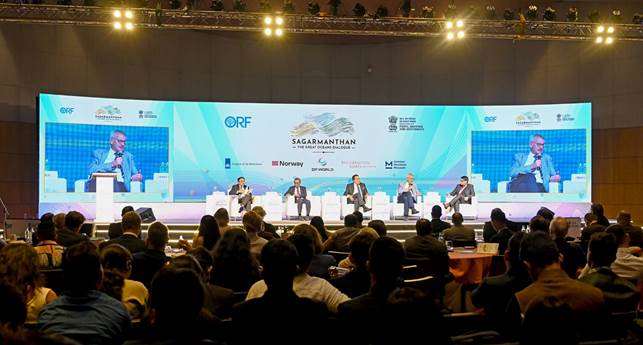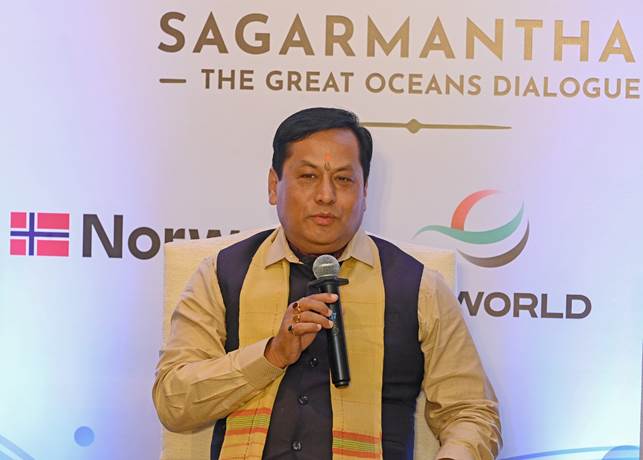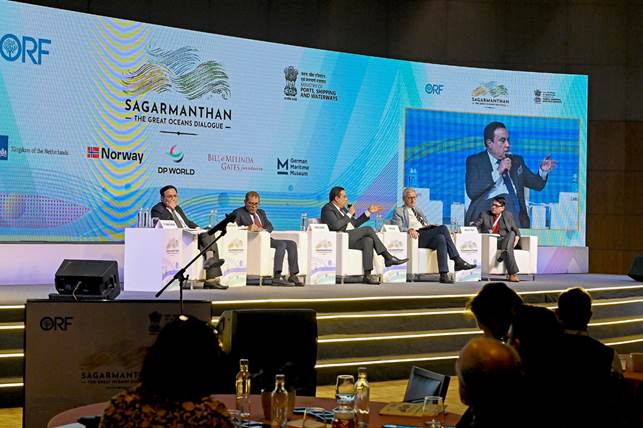Ministry of Ports, Shipping and Waterways
Sagarmanthan Draws Successful Closure with Focus on Applying Knowledge for Sustainable Evolution of Maritime Sector
As we strive to realise the vision of a Viksit Bharat by 2047, dialogues such as Sagarmanthan are invaluable to build consensus, partnerships for a prosperous future: PM Narendra Modi
India to enter the Top 10 Global Manufactures of Ships by 2030: Shri Sarbananda Sonowal
Global South to determine the shape of Ocean Trade in the 21st Century: Shri Sarbananda Sonowal
Sustainability is a pillar of India’s Maritime Policy and our vision is to make India the Shipbuilding Capital of the World: Shri Sonowal
Posted On:
19 NOV 2024 7:42PM by PIB Delhi
Sagarmanthan - The Great Oceans Dialogue, an initiative by the Ministry of Ports, Shipping & Waterways (MoPSW) and the Observer Research Foundation (ORF), drew a successful closure here today. The sessions attempted discussions and examination of how partnerships can be developed and build upon.

The Prime Minister of India Narendra Modi shared his message on the successful organising of the maiden maritime event - Sagarmanthan, The Ocean’s Dialogue - being held at the national capital. PM Modi called for success of Sagarmanthan to build consensus for partnerships of a prosperous future of humanity.
In his message sent from Camp Office in Nigeria, the PM Modi shared, “Our vision for a free, open and secure maritime network - be it the Indian Ocean or the Indo Pacific region - is finding resonance across the world. The ‘Indo Pacific Oceans Initiative’ envisions marine resources as a key pillar for growth for nations. This dialogue on oceans further strengthen the rules-based world order and enhance peace, trust and friendship between nations. As we strive to realise the vision of a Viksit Bharat by 2047, dialogues such as Sagarmanthan are invaluable to build consensus, partnerships and most importantly, a prosperous future. With the collective efforts of all stakeholders, I am confident that these discussions will resonate far and wide, paving the way toward a brighter, more connected future.”
Sagarmanthan is South Asia’s largest maritime thought leadership forum. Organized by the Ministry of Ports, Shipping and Waterways (MoPSW) in partnership with the Observer Research Foundation (ORF), Sagarmanthan offers a premier platform for global leaders, policymakers, and visionaries to share insights and shape the future of the marine sector. With critical themes spanning the blue economy, global supply chains, maritime logistics, and sustainable growth, the dialogue aims to chart a bold, actionable course for a vibrant and future-ready maritime ecosystem.

During the one on one conversation, the Union Minister of Ports, Shipping & Waterways, Sarbananda Sonowal, said, “India has a vision of becoming a major maritime nation by 2030, as envisioned by the dynamic Prime Minister Shri Narendra Modi ji. With our sustained effort to infuse modernisation, digitisation and mechanisation of the sector, we have broken through the issues of inefficiency, which is a thing of past now. Given that India has the rich talent pool as well as resources to become a major shipbuilding nation, we are aiming to enter the Top 10 of ship building countries by 2030 while working our way to become world’s Top 5 by 2047 - a milestone key to realisation of the vision of PM Narendra Modi ji’s Atmanirbhar Bharat. We are also confident that the rich resource pool and a vibrant democratic set up will embolden our ports to handle 10,000 Million Tonnes of cargo by 2047.” These remark by the Minister at the inaugural session of the second day of Sagarmanthan set the tone. The conversation was conducted by Samir Saran, President, Observer Research Foundation (ORF).
The Union Minister also interacted with technical experts on creating a circular blue economy. While the session focused on sustainability at sea as priority, the discussion attempted to hedge solutions around its many challenges. Nadeem Nazurally, Associate Professor, University of Mauritius; Nancy Karigithu, Special Envoy and Advisor, Blue Economy, Executive Office of the President, Kenya; Nwabisa Matoti, Research Director, South African International Maritime Institute, South Africa; Oda Korneliussen, Programme Manager, Avfall Norge, Norway, Peter Aukamp, Senior Advisor, goodcarbon, Germany interacted with the Union Minister. The session was moderated by Catharina Frostad, Co-Founder, Clean Sea Solutions, Norway.
Sarbananda Sonowal further said, “Blue Economy is an important aspect of humanity’s evolution. It is important that global collaboration takes driver’s seat while domestic energy is revitalising our approach to the blue economy. This event is aimed at finding creative solutions and new policy directions that empower coastal communities and oceans based businesses. Sagarmanthan has given a start to identify pathways and secure supply chains through as much green energy as possible while working on effective partnerships between the local, the global and the corporate. Various aspects of maritime sector like shipbuilding, working conditions of seafarers bridging gender gap, financing future development, innovative solutions, strategies to rebuild resilience and prosperity along our coasts while developing new routes for newer resources were discussed at length here today. This has given us ample knowledge - the nectar of Sagarmanthan - which we will respectfully study and apply towards sustainable evolution of maritime sector.”
At the valedictory session, the Union Minister of State, MoPSW, Shantanu Thakur delivered his address thanking all the esteemed experts from across the world along with more than 1700 delegates from 61 countries for their engrossing participation at the event. The Minister said, “As we gather today at the closing of the Sagarmanthan, I am inspired by the powerful dialogue and innovative ideas that have emerged. This platform has once again affirmed India’s maritime strength and its pivotal role in global trade and economic growth. Our ports are not merely gateways to trade—they are lifelines of progress, engines of employment, and anchors of sustainable development. The insights shared here reaffirm the potential of harnessing technology, fostering green initiatives, and deepening collaborations to make our maritime infrastructure world-class. Under the visionary leadership of Prime Minister Shri Narendra Modi ji we are scripting a new chapter in India's maritime story—one that is bold, resilient, and inclusive. Let us remain steadfast in our commitment to a future where our coasts drive prosperity, our seas carry hope, and our ports connect aspirations. The journey has only begun.”
The Union Minister Sarbananda Sonowal also delivered keynote address at the Ministerial Dinner Roundtable with the Think Tank community over dinner last night. The opening remarks were made by the Union Minister of State, MoPSW, Shantanu Thakur while the Executive Director and Director of Research, Egyptian Centre for Economic Studies, Egypt, Abla Abdel-Latif, Senior Research Fellow, Naval Warfare and Advance Technology, Allison Centre for National Security, USA, Brent Sadler; Senior Fellow, Strobe Talbott Centre for Security, The Heritage Foundation, USA, Bruce Jones; Senior Research Fellow, Korea Maritime Institute, Republic of Korea, Jungho Nam; Senior Programme Officer, Circle the Med Forum, Greece, Konstanitinos Foutzopoulos; the Secretary General, Forum Oceano, Portugal, Rube Eiras; the Director General Research and Information Systems for Developing Countries, India, Sachin Chaturvedi; the National Maritime Strategy Coordinator, India, Vice Admiral (Retd) G Ashok Kumar spoke. The vote of thanks was given by the Chairman, Inland Waterways Authority of India (IWAI), Vijay Kumar.
On the Euro Afro Asian century: connecting the heartlands of future growth session, Ruben Eiras, Secretary General, Forum Oceano, Portugal, pointed out importance of ‘digitisation and its integration with Artificial Intelligence applications for optimising routes and also for advanced vessel dynamics.’ Eiras also acknowledged how India has been developing Inland Waterways and how other countries can benefit from this development. At the event, experts also hedged intelligence towards finding greener solutions without disrupting the supply lines of the world. Dawoon Jung, Lecturer, Australian National Centre for Ocean Resources and Security, University of Wollongong, Australia, underscored how there is a need to develop regulations for the use of alternative fuels. During the ‘Energy and Shipping: Charting a Course to Sustainable Trade’ session, Jonathan Christensen, Chief Executive Officer, Global Maritime Forum, Denmark, suggested availability, affordability & acceptability as a broad framework. He further said how India’s use of green ammonia as fuel can be a learning experience for the world. Luc Arnouts, Vice President, Port of Antwerp-Bruges, Belgium said how governments should close the gap between grey and green shipping.

Another engaging session at Sagarmanthan titled ‘Rethinking Labour at Sea: Overcoming Enduring Inequalities,’ Luisito delos Santos, Director, Planning and Policy, Maritime Industry Authority, Philippines shared how just and humane treatment of seafarers is key. Helene Tofte, Executive Director, Norwegian Shipowners’ Association, Norway, argued for the need to have global regulation as shipping is a global business. Shyam Jagannathan, Director General of Shipping, Directorate General of Shipping, India set the scene while highlighting India’s prowess as the world’s third largest seafaring country in the world. He also shared how the Government has implemented institutional support for women at sea via ‘Sagar Mein Samman.’
On India’s quest to become top ship manufacturing country in the world, global experts from Netherlands, Panama, Norway, Egypt, Australia discussed with leading Indian maritime experts on various aspects of ship building. The session touched upon why it is necessary to restore resilience, and decentralised production of global shipbuilding, various frameworks for incentivising innovation and streamlining processes in the ship building industry and how rest of the world can learn best practices of ship building from world’s leading ship manufacturing nations. Harrie de Leijer, Partner, Nestra, Netherlands, said that solutions must be looked at to reduce operation at cost while availability and affordability must be concerned. José Digerónimo, President, Maritime Chamber of Panama, Panama also underscored how cooperation with India is crucial to modernise fleet. Line Ollestad, Advisor, Norwegian Shipowners’ Association, Norway substantiated as how India provides an opportunity as ‘Norway is in need of deep sea vessels.’
Many world leaders like Carl Bildt, Former Prime Minister of Sweden and Co-Chair, European Council on Foreign Relations, Sweden; Mehdi Jomaa, Former Prime Minister, Tunisia among others spoke at the sessions in the ‘Sagarmanthan - The Oceans Dialogue’.
Identified as the region’s first of its kind thought leadership event on maritime sector, ‘Sagarmanthan - the Great Oceans Dialogue’, has been designed around four central themes which are New Frontiers, Blue Growth Partnerships for Progress, Green and Blue, and Coasts & Communities. The New Frontiers will explore subjects around connectivity, infrastructure and development in a dynamic world. The second theme, Blue Growth, is aimed at fostering partnerships for progress. The Green & Blue theme will dabble at important issues of sustainability, technology and innovation. The discussion will also hover around maritime governance and social impact, which is covered under the Coasts and Communities theme.
India’s maritime sector serves as the backbone of its trade and commerce, handling around 95% of the country’s trade by volume and 70% by value. With 12 major ports and over 200 notified minor and intermediate ports, the country’s port infrastructure underpins its growing economy. As the sixteenth-largest maritime nation in the world, India occupies a key position on global shipping lanes. Most cargo ships traveling between East Asia and destinations like America, Europe, and Africa traverse Indian waters, highlighting the nation’s strategic importance. The sector’s contributions extend beyond trade. India boasts a fleet of 1,530 ships sailing under its flag as of 2023, a testament to its growing presence in global shipping. Additionally, the country is the third-largest in the world in terms of ship recycling by tonnage, underscoring its role in sustainable maritime practices and the global supply chain. This prominence complements the nation’s efforts to modernise and expand its port infrastructure. Between 2014-15 and 2023-24, major ports increased their annual cargo-handling capacity from 871.52 million tonnes to 1,629.86 million tonnes, reflecting an impressive growth of 87.01%. In the financial year 2024 alone, Indian ports managed 819.22 million tonnes of cargo, a 4.45% rise from the previous year. This growth aligns with a surge in merchandise exports, which climbed to USD 451 billion in FY23 from USD 417 billion the year before.
NKK/AK
*****
(Release ID: 2074771)